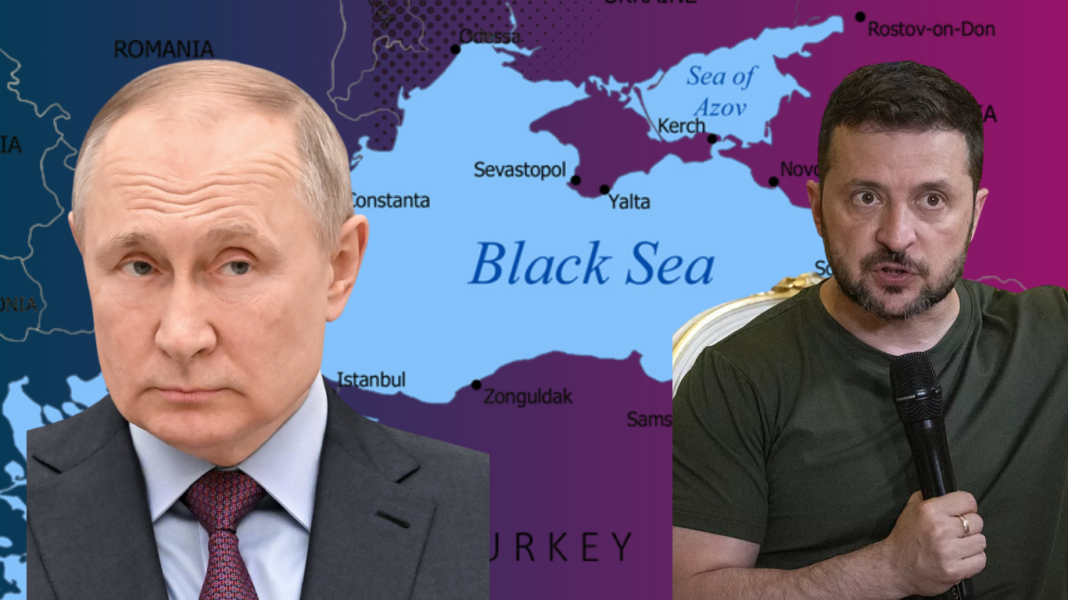The Black Sea has emerged as a geopolitical fulcrum in Russian strategy, as is evident from its ongoing war with Ukraine. With the war prolonging into April 2025 and no peace on the horizon, Russian President Vladimir Putin’s refusal to halt hostilities attests to the sea’s supreme importance to Moscow. Ukrainian President Volodymyr Zelensky has consistently spoken of Russia’s determination to maintain its ability to strike Ukrainian cities and ports from the Black Sea—a strategy that has de facto turned this sea into an instrument of war. Beyond the battlefield, the Black Sea supports Russia’s military dominance, economic power, and historical ambition. Why it is so critical to Russia is outlined below.
A Military Platform of Enormous Strength
The Black Sea has been transformed into a platform for Russia’s war on Ukraine. Russia bombs Ukrainian civilian targets and infrastructure with missiles from its Sevastopol naval base in occupied Crimea. Recent attacks, as documented by reporting from the Kyiv Independent, demonstrate how Ukraine’s terrain has been scorched by missiles fired from the Black Sea. This gives Russia the capability to pressure Ukraine’s south and east, providing it with a strategic advantage in the war. A ceasefire, and especially one not on terms convenient to Moscow, risks diminishing this military leverage—a prospect Putin appears reluctant to contemplate.
The Sevastopol base, a jewel in Russia’s naval crown, is a symbol of Moscow’s regional dominance. Control over Crimea and the adjacent sea ensures that Russia has the ability to project power not just into Ukraine but over the broader Black Sea region. To relinquish this foothold would undermine Russia’s ability to bully neighbors and pose as a regional superpower.
A Gateway to Global Trade
Aside from its strategic value, the Black Sea is a vital economic artery for Russia. It leads to the Mediterranean Sea via the Bosporus Strait, providing Russia with access to European, Middle Eastern, and African markets. It is an essential outlet for exporting grain, oil, and other goods—economic lifelines for a Russian economy squeezed by Western sanctions. Anything that disrupts Russia’s monopoly over Black Sea shipping lanes, such as a ceasefire that allows Ukraine or other global powers to challenge Moscow’s dominance, would put these economic interests at risk.
The war has already disrupted global trade flows, as Ukraine’s ports are under constant threat. Russian control of the Black Sea ensures that it continues to strangle these important arteries, even as it is otherwise diplomatically isolated. For Putin, to lose this would be to give up a convenient tool of economic pressure.
Securing Crimea and Historical Claims
Russia’s annexation of Crimea in 2014 was a turning point in its Black Sea strategy. The peninsula’s strategic location enhances Moscow’s naval capabilities and entrenches its bid for historical dominance in the region. Crimea, to Putin, is more than a military base—it’s a symbol of Russia’s resurgence, a clawing back of territory lost after the breakup of the Soviet Union. Continued control over the Black Sea by the firm ensures that Crimea will remain squarely in Russia’s orbit, beyond Ukrainian or Western reach.
A ceasefire that limits Russia’s ability to act freely in the Black Sea could embolden efforts to reverse Moscow’s control over Crimea. This is a risk that Putin cannot afford, both for strategic reasons and because of his own personal domestic reputation as a defender of Russian sovereignty.
A Bargaining Chip in Diplomacy
The Black Sea is likewise a diplomatic instrument for Russia. At the point when the United States brokered an arrangement on March 25, 2025, to reduce violence in the Black Sea and ensure shipping, Ukraine signed on immediately. Russia, in any case, made requests, with Putin demanding the lifting of specific Western sanctions as a precondition for implementation. This is all part of a grand strategy: by militarizing its control of the Black Sea, Russia can extort concessions from the West and maintain leverage at the negotiating table. A ceasefire without these benefits would decrease this bargaining power, and Moscow would have less influence on the world stage.
Conclusion: Putin’s Unyielding Stance
The Black Sea is far more than a water body to Russia—it is a military stronghold, an economic artery, and a matter of national prestige. Vladimir Putin’s opposition to an unconditional ceasefire stems from the fear that any compromise would erode these benefits. With Zelensky urging the world to put pressure on Moscow, the stakes in the Black Sea just continue to rise. For Russia, failure here is not just a strategic defeat; it’s an existential one to Putin’s aspirations for a reconstituted Russian empire. Until the West and Ukraine can equal this strategic calculus, the Black Sea will remain a battleground—and a weapon—in Russia’s hands.
A global media for the latest news, entertainment, music fashion, and more.





